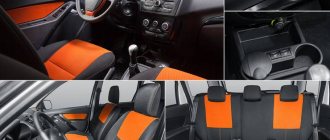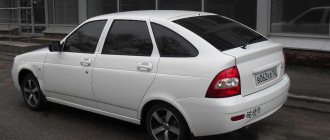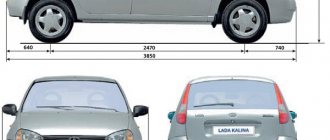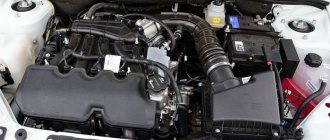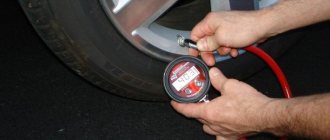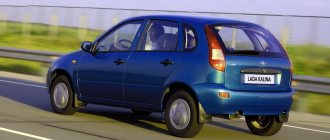Performance characteristics of VAZ 1119 Lada Kalina hatchback
Maximum speed: 165 km/h Acceleration time to 100 km/h: 12.9 sec Fuel consumption per 100 km in the city: 11.0 l Fuel consumption per 100 km on the highway: 6.1 l Fuel consumption per 100 km in the combined cycle: 7.8 l Fuel tank volume: 50 l Vehicle curb weight: 1080 kg Permissible gross weight: 1555 kg Tire size: 175/70 R13
Engine characteristics
Location: front, transverse Engine capacity: 1596 cm3 Engine power: 80 hp Number of revolutions: 5200 Torque: 120/2700 n*m Power system: Distributed injection Turbocharging: no Gas distribution mechanism: no Cylinder arrangement: In-line Number of cylinders: 4 Number of valves per cylinder: 2 Recommended fuel: AI-95 Environmental standard: EURO II
Brake system
Front brakes: Disc Rear brakes: Drum
Steering
Power Steering: Electric Power Steering Type: Rack and Pinion
Transmission
Drive: Front Number of gears: manual gearbox - 5 Gear ratio of the main pair: 3.7
Suspension
Front suspension: Shock absorber strut Rear suspension: Trailing arm
Body
Body type: hatchback Number of doors: 5 Number of seats: 5 Vehicle length: 3850 mm Vehicle width: 1700 mm Vehicle height 1500 mm Wheelbase: 2470 mm Front track: 1430 mm Rear track: 1410 mm Ground clearance (clearance): 160 mm Trunk volume: 235 l
| 11193 | 11193-40 | 11194 | 11196 | |
| 2006– | 2006–2013 | 2007– | 2011–2013 | |
| basic | ||||
| steering wheel location | left | |||
| Number of doors | 5 | |||
| number of seats | ||||
| Total | 5 | |||
| of them are inferior | ||||
| geometry | ||||
| dimensions | ||||
| length | 3 850 mm | |||
| width | 1,700 mm | |||
| height | 1 500 mm | |||
| wheelbase | 2,470 mm | |||
| track | ||||
| front | 1 430 mm | |||
| back | 1 410 mm | |||
| ground clearance | ||||
| standard | 160 mm | |||
| weight | ||||
| equipped | 1,080 kg | 1,155 kg | 1,080 kg | |
| full | 1,555 kg | |||
| engine | ||||
| Name | VAZ-21114 | VAZ-11183 | VAZ-11194 | VAZ-21126 |
| type | Piston | |||
| location | front, transverse | |||
| supply system | injector | |||
| cylinders/valves | l4/2 | l4/4 | ||
| volume | 1,596 cm³ | 1,390 cm³ | 1,597 cm³ | |
| power | ||||
| power | 81 hp | 82 hp | 89 hp | 98 hp |
| ranging from | 5,200 rpm | 5,100 rpm | 5,250 rpm | 5,600 rpm |
| torque | ||||
| torque | 120 Nm | 132 Nm | 127 Nm | 145 Nm |
| ranging from | 2,700 rpm | 3,800 rpm | 4,200 rpm | 4,000 rpm |
| in the range up to | 2,700 rpm | 4,800 rpm | ||
| compression ratio | 10 | 11 | ||
| fuel | AI-95 | |||
| turbocharging | No | |||
| cooling | liquid | |||
| Gas distribution mechanism | SOHC | DOHC | ||
| transmission | ||||
| drive unit | front | |||
| Transmission | Manual transmission 5 | |||
| clutch | Single disc, dry | |||
| suspension and steering | ||||
| steering type | Rack and pinion, with electromechanical amplifier | |||
| dynamic characteristics | ||||
| maximum speed | 160 km/h | 164 km/h | 165 km/h | 183 km/h |
| acceleration to 100 km/h | 12.9 sec | 12.5 sec | 12.2 sec | 11.5 sec |
| speed limiter | No | |||
| performance characteristics | ||||
| fuel tank volume | 50 l | |||
| trunk volume | 235–545 l | |||
| fuel consumption | ||||
| Unspecified method | ||||
| in the city | 9.8 l/100km | |||
| on the road | 5.3 l/100km | |||
| mixed mode | 7.8 l/100km | 7.3 l/100km | 7 l/100km | 7.2 l/100km |
| brake system | ||||
| ABS | No | Yes | No | Yes |
| front brakes | ||||
| description | Disk | ventilated disc | ||
| rear brakes | ||||
| description | Drums | drums | ||
| wheels and rims | ||||
| front | 5J × 13 175/70 R13 | 5.5J × 14 175/65 R14 | ||
| rear | 5J × 13 175/70 R13 | 5.5J × 14 175/65 R14 | ||
Weight of LADA Kalina
The curb weight of the VAZ Kalina II 1.6 MT station wagon with an empty fuel tank is 1024 (kg).
Weight of modifications:
According to the passport data, the curb weight of the LADA Kalina model is:
- VAZ Kalina I 1.4 MT station wagon (2007 - 2013): 1080 (kg) 1555 (kg).
- VAZ Kalina I 1.4 MT sedan (2007 - 2013): 1080 (kg) 1555 (kg).
- VAZ Kalina I Sport 1.4 MT hatchback (2008 - 2013): 1080 (kg) 1555 (kg).
- VAZ Kalina II 1.6 MT station wagon (2013 - present): 1060 (kg) 1560 (kg).
Algorithm for calculating the weight of a car without fuel:
If it is necessary to determine the curb weight of a VAZ Kalina II 1.6 MT station wagon with an empty fuel tank, then first determine the mass of fuel (MT) in the tank (at maximum filling):
- MT = PT x OB, where PT is the density of the fuel (for gasoline - 710 (kg)/m3); OB is the volume of the fuel tank (50 l, indicated in the car’s passport).
- MT = 710 x 0.050 = 36 (kg).
The curb weight of a vehicle with an empty fuel tank is determined as the mathematical difference between its total curb weight and the fuel weight:
Important: the VAZ Kalina model range is produced by the Russian automobile manufacturer AvtoVAZ, car class: small, 2 generations of the model were produced from 2004 to 2022.
Other names:
The Group II small class car LADA Kalina is also known under the following indices:
Years of production Years of production of all modifications of the model: 2004-2017.
Dimensions
Compared to previous VAZ models, the Lada Kalina has increased in size, which has a positive effect on the space in the cabin and the amount of luggage space in the trunk; the dimensions are noticeably larger. Note that the height, as well as the width, of the car remained unchanged, but the length increased noticeably.
New Lada: Stability control system (ESС) in LADA cars. Survey from AVTOVAZ » Lada Priora (VAZ Priora) | Price for Priora, Priora hatchback, Priora station wagon, photo of Priora, tuning for Priora
It is these dimensions that now amount to 3.89 m. Let us recall that the width is 1.7 m and the length is 1.5 m. These are the dimensions of the car body. Another significant advantage of the Kalina is the ability to be equipped with an automatic transmission unit. The owners immediately appreciated this move, which allows the nimble Lada Kalina to “tolerate” city traffic jams well.
Let's touch on the body. For the practical “Russian”, the developers have provided an all-metal body frame.
The vehicle's curb weight reaches 1160 kg, and with full regulatory load it is 1560 kg. Moreover, we have already reported the dimensions of the body above, and they are not small.
We know the dimensions of the body, it’s time to talk about the dimensions of the luggage compartment Kalina now offers the owner a number of advantages. If you fold the back rows, the useful volume of space for placing cargo “grows” to 550 liters. Here, practical drivers will appreciate this solution, since they often have to transport items whose dimensions exceed the parameters of the trunk itself.
The station wagon modification has also grown significantly in size. The manufacturer has additionally equipped the roof of this body version with roof rails, which allows the owner to install an external luggage compartment for transporting large luggage.
The length of the station wagon exceeds 4 meters, which is longer in comparison with a hatchback or the same sedan. The width of the version remains unchanged - 1.7 m, which is also true for the height - 1.5 m.
Separately, we should touch upon the trunk of the station wagon, which has no competitors in the model line of all LADA Kalinas. Folding the backrests of the stern seats allows you to “increase” the volume of usable space to an incredible 670 liters for this class.
The fuel tank on the station wagon has been migrated from the sedan, which confirms the identical volume, capable of holding a maximum of 50 liters.
new-lada.ru
Other parameters of Lada Kalina:
| Total weight of the Lada Kalina car | |||
| General view General view of the car | Curb weight min (kg) Minimum vehicle weight for different modifications of Lada Kalina | ||
Data are presented in kilograms (kg)
Caution: the above data are official figures from manufacturers, however, please note that the information is for reference only and does not guarantee absolute accuracy.
Source
Lada Kalina hatchback
The Lada Kalina hatchback in the back of the VAZ 1119 was produced at AvtoVAZ factories from 2006 to 2013. And although we don’t like five-door models, this version turned out to be the most popular in the line. Three modifications of the car were offered: 11193 with an 80 hp engine, 11194 with 89 hp. and 11196 for 98 hp.
The Kalina family also includes models: 1117, 1118 and Sport.
Modifications of Lada Kalina 1119
The hatchback model was produced in our country from 2006 to 2013 without any changes.
| 1.4 l 11194 89 hp 127 Nm and 5-speed manual transmission VAZ 1118 |
| 1.6 l 11183 80 hp 120 Nm and 5-speed manual transmission VAZ 1118 |
| 1.6 l hp 132 Nm and 5-speed manual transmission VAZ 2181 |
| 1.6 l 21126 98 hp 145 Nm and 5-speed manual transmission VAZ 1118 |
We have separate detailed material on all Kalina power units on our website.
You can find the online user manual for the car on this portal
A lot of useful information is posted on the forum of owners of this model
All the weak points of the car are well described in the materials of the magazine Behind the Wheel
2011 Lada Kalina. Review (interior, exterior)
Constructions
Engine 11193 is designed for installation on the Lada Kalina car of various modifications. Volume 1.6 liters and power 102 hp. Enough for this car. An in-line engine is located transversely in the engine compartment. 4 cylinders with a diameter of 82 mm consume 9.6 liters of gasoline per 100 km.
The design features include:
- frequent damage to the drive system belt, blockage of oil, fuel and air filters;
- possible defects of piston rings;
- decrease in oil pressure.
Features of motor 11193
To avoid serious consequences as a result of these malfunctions and increase the service life of the engine, it is recommended to change the belts on it after 50-65 thousand km of the vehicle.
The parts are made of high quality steel and have increased strength. To increase power by 10%, the throttle valve is equipped with an electric drive. This also ensured a reduction in exhaust gas toxicity. The valve mechanism consists of 16 valves. A block with an improved cylinder surface meets the requirements of the times. You can find it by color: block 11193 is painted gray.
If you have to sort out the unit, after removal the following are dismantled:
- pump operating in the cooling system;
- generator;
- electric starter;
- fuel system pump;
- collectors;
- camshaft belt;
- valve cover;
- flywheel;
- clutch mechanism;
- cylinder head.
Defective parts are immediately replaced. Oil seals, seals and gaskets are replaced. Assembly is carried out in reverse order. Before driving, it is necessary to inspect the main components of the car and constantly monitor the readings of technical fluid level sensors.
The engine can be installed on the tenth car model. All bosses and mounting holes of the cylinder block are suitable for this. It is not advisable to do tuning or modifications so as not to damage the engine.
Design 11193
Technical characteristics of Lada Kalina hatchback 1.4 liter 16v 5-speed manual transmission
| Motor power | 89 hp |
| Torque | 127 Nm |
| Acceleration to 100 km/h | 12.5 s |
| Max. speed | 165 km/h |
| Fuel type | AI-92 |
| Consumption in the city | 8.3 l |
| Highway consumption | 6.2 l |
| Mixed flow | 7.0 l |
| Volume of the tank | 50 l |
| Trunk volume | 235 l |
Disadvantages, breakdowns and problems of Lada Kalina 1119
In the first years, the car body resists corrosion well, but then it slowly gives in. Nowadays it is difficult to find Kalina on the secondary market without rust in the arches or along the edges of the doors.
For its time, the interior design looked quite interesting, but due to the low quality of materials and domestic assembly, creaks are annoying from the first kilometers.
In the rich configurations of this model, the electrician throws up a lot of problems. Often the central locking, power windows or the entire panel fails.
The 1.6-liter 8-valve engine with the VAZ 11183 index is the weakest engine in the line. The sensors and thermostat here have a low service life, and oil leaks often occur. But many owners love it because when the belt breaks, it usually does not bend the valve.
The 1.4-liter 16-valve engine with the VAZ index 11194 has always been installed only on Kalina. It has the same problems, plus it often consumes oil and bends the valve when the belt breaks.
The 1.6-liter 16-valve engine with the VAZ 21126 index is the newest, most powerful and reliable. Failures in the ignition system or sensors do occur here, but less frequently than with other internal combustion engines. The danger for him is the wedge of the pump with a broken timing belt, the valve bends 100%.
The manual transmission of the VAZ 1118 is famous for its unclear shifts, howling at certain speeds, the modest life of the synchronizers, and also the sudden loss of reverse gear.
In the last year of production, a manual VAZ 2181 with a cable control drive was installed. This box is also a little noisy, but it is definitely much more pleasant to use.
A simple and cheap suspension lasts a long time, and if it breaks, it won’t ruin the owner. Up to 100,000 km, wheel bearings, shock absorbers or ball bearings are most often replaced.
If you install normal pads instead of standard ones, then there will be no complaints about the brakes. The steering rack often knocks already at 50,000 km and the electric power steering fails.
Source
Technical characteristics of VAZ 1119 Lada Kalina hatchback
Performance characteristics of VAZ 1119 Lada Kalina hatchback
Maximum speed: 165 km/h Acceleration time to 100 km/h: 12.9 sec Fuel consumption per 100 km in the city: 11.0 l Fuel consumption per 100 km on the highway: 6.1 l Fuel consumption per 100 km in the combined cycle: 7.8 l Fuel tank volume: 50 l Vehicle curb weight: 1080 kg Permissible gross weight: 1555 kg Tire size: 175/70 R13
Engine characteristics
Location: front, transverse Engine capacity: 1596 cm3 Engine power: 80 hp Number of revolutions: 5200 Torque: 120/2700 n*m Power system: Distributed injection Turbocharging: no Gas distribution mechanism: no Cylinder arrangement: In-line Number of cylinders: 4 Number of valves per cylinder: 2 Recommended fuel: AI-95 Environmental standard: EURO II
Brake system
Front brakes: Disc Rear brakes: Drum
Steering
Power Steering: Electric Power Steering Type: Rack and Pinion
Transmission
Drive: Front Number of gears: manual gearbox - 5 Gear ratio of the main pair: 3.7
Front suspension: Shock absorber strut Rear suspension: Trailing arm
Body type: hatchback Number of doors: 5 Number of seats: 5 Vehicle length: 3850 mm Vehicle width: 1700 mm Vehicle height 1500 mm Wheelbase: 2470 mm Front track: 1430 mm Rear track: 1410 mm Ground clearance (clearance): 160 mm Trunk volume: 235 l
Source
Dimensions value
The Kalina family is small but friendly. Some are a little bigger, some are a little smaller, but together they can make it to the parade. The body of the Lada Kalina is made in several modern modifications: sedan, hatchback, station wagon, cross and sport. Their overall dimensions do not vary much.
| Sedan | Hatchback | Station wagon | Cross | Sport | |
| Length, mm | 4040 | 3850 | 4040 | 4104 | 3943 |
| Width, mm | 1700 | 1700 | 1700 | 1700 | 1700 |
| Height | 1500 | 1500 | 1500 | 1560 | 1450 |
| Weight | 1098 | 1098 | 1128 | 1125 | 1150 |
| Base | 2476 | 2476 | 2476 | 2476 | 2476 |
| Clearance | 160 | 160 | 145-160 | 183 | 150 |
The width and wheelbase are the same for all, as it should be for related models. But the length, height and ground clearance are different. Accordingly, the volumes and masses are different. The history of Lada models has seen long stagnation and a period of failure. In 2004, the release of the first Kalina from the assembly line ushered in a new era. Since then, new items appear almost every season, and the ranks of owners of the most popular car in Russia are growing from year to year.
The geometric dimensions of the body are important, but no less interesting is the volume of the trunk. All Kalina models are designed to allow the rear seats to be folded forward and increase luggage compartment space. The most voluminous trunks are for the sedan, station wagon and cross: 355/670 liters. “Hatchback” and “sport” are more modest - 240/550 hp. It’s also not bad, as many city car owners will agree with.
In the ranks of Kalina there is another model - Lada Kalina City (Oka-3), made on the VAZ-1117 platform. It appeared in 2005 and for some time was considered a replacement for the Oka small car, but this assumption is incorrect. It has almost the same dimensions, height and width as other Kalinas, only the length is 3650 mm.
There is another dimensional indicator that is rarely interested in until they get stuck in a rut. At this point, some people discover the fact that the distance between the front wheels is different from the distance between the rear. This parameter is called: front and rear wheel track. For the “sedan” and “hatchback” with “station wagon” - 1430/1414 mm, for the “sport” - 1431/1432 mm and for the “cross” - 1430/1418 mm.
New Lada: “LARGUS” IN LETTERS AND NUMBERS | We're going on Largus
The difference in millimeters may not be noticeable to the eye, but it is easy to feel when a few millimeters are not enough to get out of an icy rut on a winter road. The track size turned out to be wrong.
Body weight of Lada Kalina Hatchback
The average body weight of the Lada Kalina Hatchback ranges from 275 (kg) to 330 (kg).
What is body mass:
Body weight refers to the weight of the part of the vehicle designed to accommodate passengers and cargo.
In most cases, body weight means the weight of the entire vehicle without accessories, doors, windows, bridges, etc.
As a rule, the mass of a car consists of the following main parts:
- engine, generator, starter, etc.;
- Transmission;
- full suspension;
- plumage (bumpers, radiators, etc.);
- body, etc.
Important: the weight of the body does not include any elements of interior equipment, upholstery, decor, etc.
What data is presented in the directory:
The weight of a conventional sedan-type body most often ranges from 250 (kg) to 400 (kg).
The table below presents all available information regarding the weight of Lada Kalina Hatchback cars.
Important: most often, manufacturers do not indicate the mass of bodies separately, therefore it can only be calculated indirectly by subtracting the mass of the component parts from the total mass. Therefore, such data will always be approximate.
Years of production Years of production of all modifications of the model: 2006-2017.
Interior space and load capacity
As for the interior of the Lada Kalina hatchback, it has remained virtually unchanged. The rear seat was slightly changed at the mounting location so that it could be easily removed, thereby significantly increasing the volume of the luggage compartment.
With the rear seat in the unfolded position, the luggage compartment volume is 350 liters. If the rear seat is folded down, or completely removed from the passenger compartment, then the standard trunk volume will almost double and will be 650 liters.
The technical characteristics of the carrying capacity for such dimensions of the luggage compartment are quite impressive. The maximum permissible weight, taking into account 4 passengers and the driver, should not exceed 500 kg. Also, in addition to the cargo in the luggage compartment, the Lada Kalina can easily take a towbar onto a tow bar, the weight of which will not exceed 900 kg, provided that there is a brake system on the towbar. In the absence of a braking system, the maximum weight will be reduced by half and will be equal to 450 kg.
The Lada hatchback has such high load-carrying characteristics thanks to its suspension. On the front axle, the car has a fully independent suspension, using shock absorbers and springs. The rear axle is semi-independent. That is, the central part of the suspension is firmly attached to the body, and the wheels move up and down, independently of each other.
